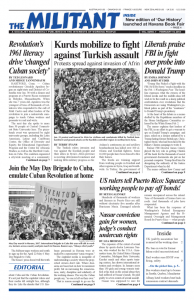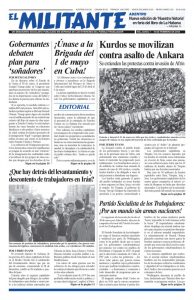HARTFORD, Conn. — Cuban revolutionary Griselda Aguilera began an eight-state and District of Columbia tour Jan. 30 with a dinner and program at a Puerto Rican restaurant in Holyoke, Massachusetts. When she was 7 years old, Aguilera was the youngest of tens of thousands of volunteers who responded to the call of Fidel Castro and other leaders of the revolution to join a nationwide campaign to teach Cuban workers and peasants to read and write.
The next day she spoke to more than 50 people at Central Connecticut State University here. The pizza-lunch event was sponsored by eight university groups, including the Latin American, Latino and Caribbean Center; the Office of Diversity and Equity; the Educational Opportunity Program and the Center for Africana Studies; as well as the Hartford Coalition on Cuba. The coalition organized a citywide meeting at a community center that night. Aguilera also visited the university’s Literacy Center and spoke at Trinity College.
She then traveled to Boston, where she spoke to 40 people at the well-known Encuentro 5 community center Feb. 2.
Most of the meetings also featured a screening of Catherine Murphy’s 2012 documentary “Maestra” (Teacher), which includes interviews with veterans of the literacy campaign, including Aguilera. The 1961 campaign was launched just two years after working people led by Castro and the July 26 Movement overthrew the Washington-backed dictatorship of Fulgencio Batista on Jan. 1, 1959.
“The literacy campaign not only achieved literacy, it changed society. There weren’t enough trained teachers, so Fidel Castro asked students to volunteer. Imagine the total life change for those who left the city!” she told the Hartford CCSU meeting. “That’s why we say they were teachers and they were taught. They learned the wisdom of the country people. Everyone worked together in the fields during the day — families, students, literacy volunteers. Then at night we had classes at dining room tables in farmers’ houses.”
Participants on both sides of the table were transformed by the revolution, she said, becoming infused with the confidence, political consciousness and moral values to run their own country.
“The literacy effort united people of different races,” Aguilera said. “In Calixto García Park in Holguín, where I was born, before the revolution whites walked on one side of the park and blacks on the other. This was one of many examples of institutionalized racism that the revolution eradicated.”
Most of the peasants were Caucasian, Aguilera said, and at first some objected to being taught by Afro-Cuban teachers.
“The revolutionary leadership oriented us to patiently discuss and convince the farmers that they had learned to discriminate from the old order,” she said. “As the campaign went on, racial discrimination receded. Today in Cuba blacks and whites are equal in everything, with the same rights. Mixed-race couples and marriages are common.”
The literacy campaign also struck a blow at social restrictions on women. “The campaign encouraged women to get out of the house and do things,” she said. “After the campaign many got scholarships to continue their education.”
In both Boston and Hartford, Aguilera was asked how such an enormous step forward was possible. “We were able to eliminate illiteracy across the island because of two things,” she answered. “The enthusiasm of the people to do it and the political will of the revolutionary government of Cuba to carry it out. Both were necessary.”
“Eliminating illiteracy was part of the program of the revolution and necessary for it to advance,” she continued. “Fidel Castro explained this in his courtroom testimony” after he was put on trial for leading the July 26, 1953, attack on the Moncada army barracks, the opening salvo of the fight against the Batista dictatorship. Castro’s testimony was printed in a pamphlet, History Will Absolve Me, and widely distributed across the island.
The revolutionary leader called on farmers to fight for land, on all working people to join in fighting for dignity, freedom of expression, access to education and health care, and to bring down the dictatorship and end Washington’s violation of Cuban sovereignty.
What is happening in Cuba today?
One participant in the Boston meeting asked what opportunities young people in Cuba have today to transform themselves.
“What we experienced then is different from today. We shared what little we had, we gave all of ourselves to the task at hand. We never worried if we didn’t have a car or designer jeans,” Aguilera replied. “Today young people are affected by what they see around them — on television, the internet, what foreign tourists have. Those of us who lived through the revolution are making an effort to educate about, maintain and rescue the values of the revolution. These aren’t monetary values, they’re moral, spiritual values.
“Cuban doctors and young literacy teachers go around the world bringing health care and culture to working people,” she said. “Tens of thousands of young Cubans leave their family and go to foreign countries, many into the hills and jungles with no comforts.”
Meeting organizers used the gatherings to invite participants to take part in the April 22-May 6 May Day brigade to Cuba sponsored by the Cuban Institute for Friendship with the Peoples (see editorial on front page). Aguilera encouraged everyone to go and learn firsthand about the revolution.
“Cuba is not a country without problems,” she said. “We have the problem of the U.S. embargo, which forces us to pay dearly for necessary items. We have many material limitations. When you come to Cuba you’ll see that much of our housing is in poor condition.
“There is a lot we lack, but we are a people in struggle and we’re happy,” she said, “and the day we don’t have the blockade we will be even better.”
“It was amazing to have Griselda here,” Milly Guzman Young, who participated in the “In the Footsteps of Che” brigade to Cuba last fall and helped organize Aguilera’s visit to Hartford, told the Militant. “It’s important to tell the truth about what Cuba has done. The U.S. government tells us lies. The fact that Cuba had the literacy program, and that they accomplished it in one year, is because of the revolution. I want people to see that this is what a revolution does, to plant that idea in their heads.”

